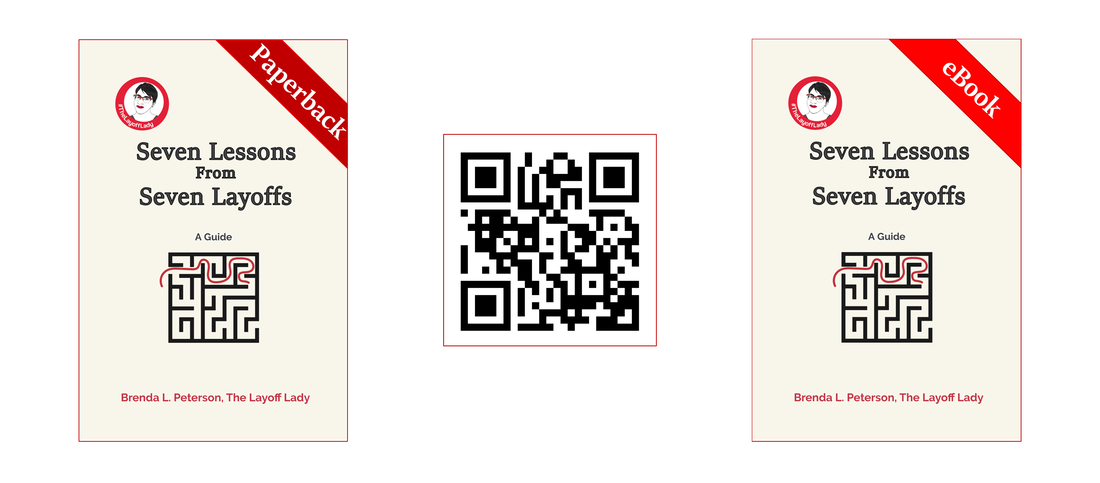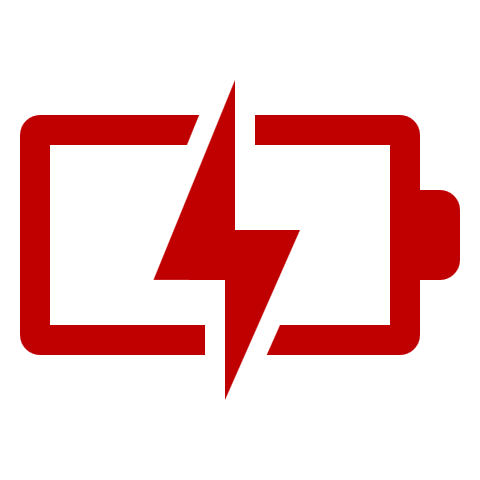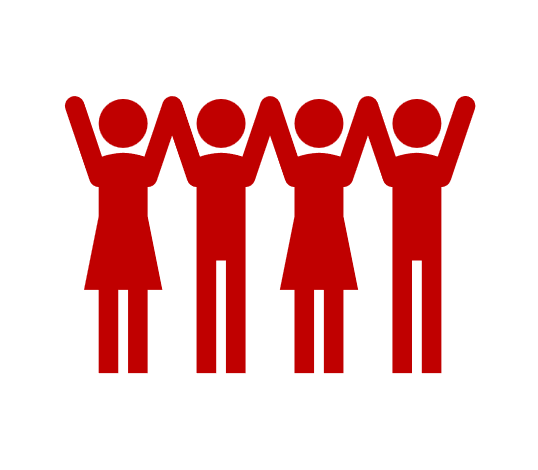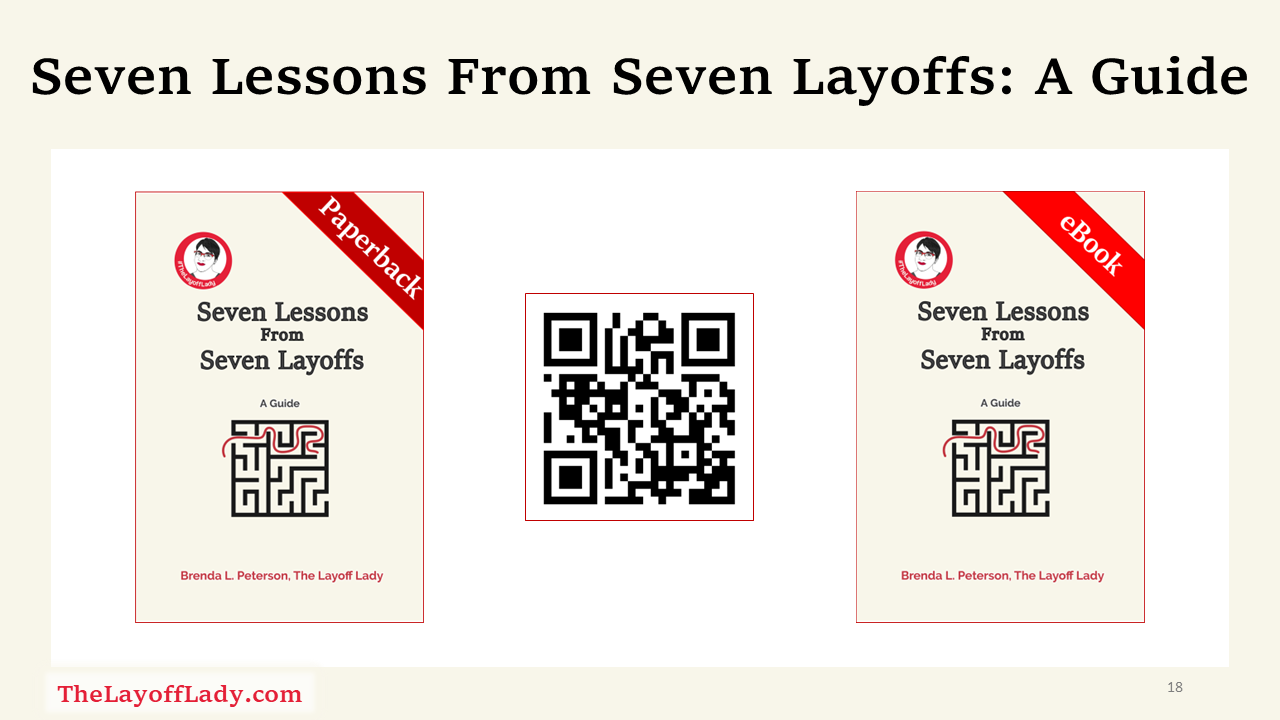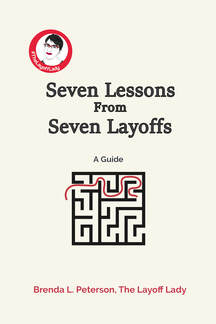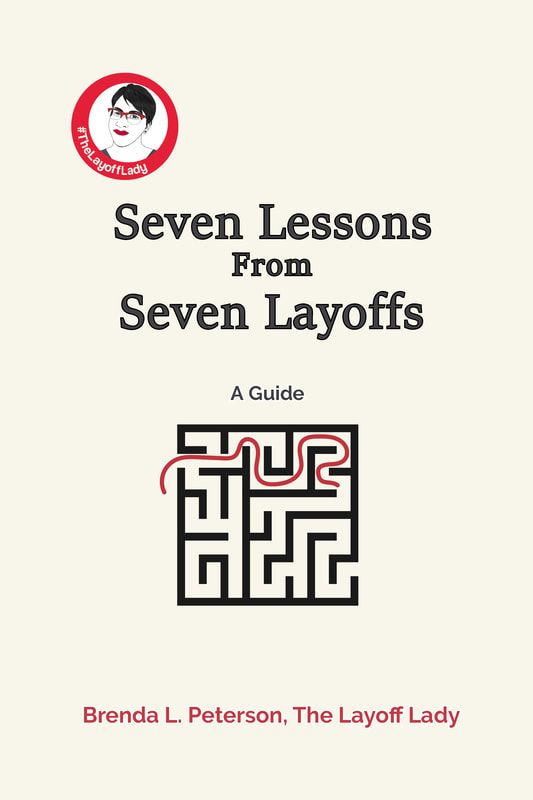|
By Brenda L. Peterson, The Layoff Lady Don't Go It AloneLife is challenging when nothing in particular is happening. When you're going through a job change (especially one you didn't plan), it's even harder. While I'm a fan of self-reliance, I also know the value of finding people who want to support you and letting them do it. You're not weak for needing people. You are smart for planning ahead for what you will need. You Need Help Because This is HardI have been through a post-layoff job transition 7 times, and it is difficult each and every time. There is the fear that it will just never end, and you'll be drifting for eternity trying to find paid work where you can pay your bills--much less in a job you want. You worry that you'll have to settle for something that may be even worse than the worst job you've ever had. You also worry that you'll run out of money and not be able to pay your bills and lose everything you own and everyone you've ever loved. While your rational mind knows this is all pretty unlikely, there will be moments when everything seems hopeless. That's where your support network comes in. No matter how resilient and downright badass you are, doing this alone makes it way harder. People Want to Help You: Make Sure to Let ThemAs an extra added bonus, people want to help you! I'm always inspired by people who come out of the woodwork to check on me, tell me about an open position, thank me for helping them once upon a time, or offer to refer me for a role. Everyone has struggled with something at one time or another, and someone has helped them. Let other people help you. Building Your TeamIt also takes a village to get you through a career transition. Relying on one person for everything is all kinds of stressful. Know that people want to help, and it's a matter of figuring out what you need, letting people know, and reaching out to people when needed. Going through a job search is challenging, even in the best of circumstances. It can be even more challenging if you're starting from a layoff (especially the part where someone else got to make a big, uninvited life decision for you). Types of Help You NeedHere's a starter list of the types of help you may need during your job transition. More specifically, here is some of what I needed. Use this as a starting point and add details as it helps you:
Who Can HelpWhen it comes to help, I start with my inner circle--close friends and family. I'm also sure to widen my support team beyond them, too. I also move beyond that immediate group. I interact with my LinkedIn connections. I tap into online groups including job search groups, The White Box Club, and even LinkedIn groups focusing on networking or a content area (like sales enablement). I interact with in-person membership groups like ATD or the Omaha OD Network. Or I seek out non-work connections through social Meetup groups or activities. Sometimes, I just spend time in coffee shops to indirectly interact with other people. It's a matter of figuring out what you need and finding a person to help. Asking for HelpKnow, too, that there will be times when you need to straight up reach out to someone because you need help. Each person will have their areas of interest and expertise, so be sure to keep that in mind when asking for help. It's helpful to consider who you might contact for different needs. Here are a few cases where I reached out to different people to ask for help:
Learn More
0 Comments
By Brenda L. Peterson, The Layoff Lady The Adventure of Finding a New JobWhether you're gainfully employed but looking for the next right opportunity for you, or you're in career transition, job searching is hard. Here are three unfortunate job searching truths that can help you manage your mindset and emotions as you work through the ups and downs of this process. Truth 1: Job Seeker Time Goes Slower Than Hiring Organization TimeWhen you're a hiring manager, you have a ton going on, and only one of those things is hiring a new person. You're still trying to manage your team, meet deadlines, troubleshoot customer problems, and juggle all the people you're considering for your open position. In an interview, when one candidate asks about the hiring process, you tell them you should know who will move on to the next steps in the process "by the end of this week"--and at the time, you believe that is a reasonable deadline. Then there is a software release with a bug that causes three meetings to be scheduled with big clients, or someone ends up out on sick leave unexpectedly, or your child has to be picked up from daycare with the flu. Friday comes and goes, and getting in touch with a candidate falls off your radar until the next week. Meanwhile, as a job seeker, you put a note on your calendar that you'll know one way or another by Friday. Then you analyze every syllable you uttered in the interview, hoping you didn't say anything awful. You rethink a facial expression you interpreted as approving and wonder if it really was that at all. You suffer through Saturday, Sunday, and Monday, secretly worrying that you will never find another job. Ever. Instead of spiraling, take action to get you closer to your goals. After the interview, email the hiring manager a thank you message and consider sending them a LinkedIn connection request. Put a note on your calendar for a few days after the hiring manager said they would contact you. Reach out to them at that time, including a few pleasantries, reiterating your interest in the role, and asking for an update. Will you get the job? It's hard to tell. Either way, you did your part. Remind yourself that you won't get every job you apply for, and reflect to see what you can learn from it. At the very least, pat yourself on the back that you didn't over-follow up (which is often worse than not following up at all), and be sure to focus on more than one job opportunity at a time. In addition, network with three more people and apply for three more jobs. Truth 2: It's Not "Your Job" Until You Receive A PaycheckInevitably as a job searcher, you run across it. THE job. It's the one you know is meant to be yours. It's perfect--easy commute, a great title, the go-to company, exactly what you are qualified (and want) to do. In your head, you think--this is MY job. You picture your new business cards, where you'll park, and how you'll introduce yourself as the "Director of Awesomeness" for this perfect company. If you're still working, you may be dreaming about the day you hand in your notice--or get excited knowing you won't have to finish a dreaded project because you'll be elsewhere. You think--why should I even bother applying for anything else because this one is SO my job! Except, well, it's not actually your job yet. You're looking at it and seeing yourself in it, but it's not real. You don't work there. No one is sending you a paycheck for it. They don't even know your name yet. You may very well still work at your company in a few months when the project you're not excited about is due. While this MAY be the job you eventually get, it's not a done deal yet. You know what else? It may not end up being your job. Apply for that job--even work hard to get it. Know, though, that you may end up not even getting called in for an interview. This doesn't mean you're not still an amazing professional with valuable qualifications. Remember, there are always many things going on when companies hire. There may be an internal candidate, a previous coworker of the hiring manager, someone who has a referral from a college friend, or someone who has even slightly more of a qualification that didn't make that job posting. When you're a hiring manager, you have a ton going on, and only one of those things is hiring a new person. You're still trying to manage your team, meet deadlines, troubleshoot customer problems, and juggle all the people you're considering for your open position. In an interview, when one candidate asks about the hiring process, you tell them you should know who will move on to the next steps in the process "by the end of this week"--and at the time, you believe that is a reasonable deadline. Then there is a software release with a bug that causes three meetings to be scheduled with big clients, someone unexpectedly ends up on sick leave, or your child has to be picked up from daycare with the flu. Friday comes and goes, and getting in touch with a candidate falls off your radar until the next week. Meanwhile, as a job seeker, you put a note on your calendar that you'll know one way or another by Friday. Then you analyze every syllable you uttered in the interview, hoping you didn't say anything awful. You rethink a facial expression you interpreted as approving and wonder if it really was that at all. You suffer through Saturday, Sunday, and Monday, secretly worrying that you will never find another job. Ever. Instead of spiraling, take action to get you closer to your goals. After the interview, email the hiring manager a thank you message and consider sending them a LinkedIn connection request. Put a note on your calendar for a few days after the hiring manager said they would contact you. Reach out to them then, including a few pleasantries, reiterating your interest in the role, and asking for an update. Will you get the job? It's hard to tell. Either way, you did your part. Remember that you won't get every job you apply for and reflect to see what you can learn from it. At the very least, pat yourself on the back that you didn't over-follow up (which is often worse than not following up at all), and focus on more than one job opportunity at a time. Whenever you fall in love with a job or think of something as "your job,” make an extra effort to apply for additional jobs--or at least game out what happens if you do not get the job. If the job you see yourself in works out, great. If not, you're still working towards your ultimate goal of finding a new role (complete with a paycheck), whichever one that might be. In addition, network with three more people and apply for three more jobs Truth 3: You Only Need One Job.Applying for jobs is a process. Looking back at my records, I have typically applied for between 40 and 100 jobs when I've been in career transition. It's easy to get discouraged. If you're working and looking for something else, you might be more selective in your applications and feel especially attached to an opening you see. Remember, not every personal referral, application, or interview will lead to an offer. Again--sometimes you apply and hear back a fat lot of nothing. Sometimes, you might get a quick rejection from a job only to see it reposted a week later. In those cases, it can be hard to see that they don't even have a good candidate, but they know it's not going to be me. That one smarts. It's also hard when you interview for a role multiple times only to hear that you didn't get the job. Even though they genuinely liked you, you didn't get it. Maybe you were a close second, perhaps they went with an internal candidate, or they ended up not filling the position. There is so much rejection in the job search process that you’ll inevitably feel sad and like maybe there is no hope for you finding the right next job for you. Instead of spiraling, take action to get you closer to your goals. At the end of the day, though, you only need one job. You only need one organization to tell you “Yes.” You only need one place where you and the employer agree to work together. Sometimes, it's helpful to remind yourself that all those no answers get you to the one yes you need. The trick is that you don't know which one will be that yes. You have to keep on keeping on until you find it. In addition, network with three more people and apply for three more jobs. Learn MoreBy Brenda L. Peterson, The Layoff Lady All The FeelsWhether due to an economic downturn, an acquisition, or a company reorganization, layoffs hapen all the time. Each person will experience a range of emotions when it happens to them. Even for someone who has gone through a layoff before, it is a tumultuous experience each and every time. Here is the good, the bad, and the ugly of the feelings people often experience surrounding an unplanned job loss. ShockThe phone call from HR, the perp walk through the office to the dreaded conference room, the last-minute ominous meeting invite, or the oddly timed tap on the shoulder all seem to come out of nowhere. There is something surreal about being pulled into a virtual or in-person room and having someone look you dead in the eye and tell you that you are going to go through a significant life change starting, well, now. Even if there were layoff rumors, news about leadership changes, or low sales reported for the quarter, it’s always a surprise on the date and time when layoffs go down. It’s the feeling of the ground being pulled out from under you. It’s the gap between expecting a full day of meetings and finding yourself in your car mid-morning with a white box. AngerEven if you were actively looking for a new role, a certain amount of anger goes along with a layoff. It could be frustrating learning about the people who didn’t get laid off (like that guy whose messes you've been cleaning up for the last year) and comparing your perceived value to theirs. It could be irritation at the timing (right after vacation, right before a holiday) and how that makes finding something new an even longer process. It might be the insult to injury when you realize that yesterday’s mission-critical work-all-night project has become irrelevant. In many cases, it might just be the maddening nature of someone else deciding when you don't get to do that job anymore instead of you getting to choose when it was time. Feeling that lack of control can be the most challenging part. SadnessExiting a job abruptly leaves a big hole in your life, starting with a 9+ hour workday being replaced with dead air and uncertainty. People who earlier that day were coworkers, casual work friendships, or confidants now may be nothing at all now that you no longer share an employer. The consistency of a morning routine, daily commute, and regularly scheduled meetings are replaced with a battle with the unknown that may last a week or a year. Sometimes, it’s easy to be hopeful about the future, and other times, it’s hard not to be mired in sadness about all the things you can’t control. FearThere is plenty to be afraid of. First, the idea of not having a paycheck is horrifying. Not knowing how long your severance check has to last is unnerving. Not having any idea how long your jobless period will last and what job you’ll end up with is sometimes unbearable. You may fear being unemployed endlessly and not being able to support yourself. You might worry about panicking and taking the first job offered to you. You could worry about holding out for something closer to the “perfect” job that may never come. You may even fear you will never get a job as good as the one you just had. On the worst days, when fear has given way to full-on catastrophizing, you could worry that you will lose your house, car, professional reputation, and everyone you've ever loved. ReliefHere's the one that might seem unexpected. If you've been at a company and "made it" through multiple rounds of layoffs, you may be waiting for your luck to run out. While you're certainly relieved to still be employed, each time you hear rumblings about reorganizations or start seeing those empty white dots pop up on Microsoft Teams, you may have had that sick feeling in the pit of your stomach waiting for it to be your turn. The strange benefit of finally being laid off is that you don't have to worry if it will happen (and when) because it just happened. At that moment, you also realize it's not as bad as you imagined, and now what there is to do is pick yourself up and create your fantastic new future. The Good NewsThrough the tumult of emotions, it’s important to acknowledge each one and process those feelings. From there, you can think about what is next for you and focuson your next steps toward the next right job for you. Learn More
by Brenda L. Peterson, The Layoff Lady Welcome To The SuckWhether you are in career transition and looking for a new job, or employed and looking for something new, job searching is always challenging--partly due to all of the uncertainty you'll face as you "wait for your life to start again" as you search for the next right role fro you. Suffice it to say that job searching can be full of obstacles that make the process hard to manage. Knowing the possible issues is the first step towards figuring out how to mitigate each challenge and move forward. Here are five unfortunate reasons I have discovered while working through job transitions and a few coping strategies for dealing with each. Reason 1: You Won't Always Interview For "The Perfect Job."Congratulations! You just found THE PERFECT JOB! You have all of the required and preferred qualifications! It's at the right level with your dream company, and you even know someone who works there who will say great things about you! Surely your days of job searching are coming to a close because you are the purple squirrel for THE PERFECT JOB! Enter reality. I'm sorry to say that you may not even manage to get so much as an initial phone screen for this position. Even when you feel like the job was tailor-made for you, it may not work out the way you want. Why might that happen? For one, the position may not actually be available. Some organizations post job openings to gauge interest in the position even though they have no solid plans to hire anytime soon. Conversely, the role may have been open for a while, and the selection process may be well underway. There could also be an internal person who will take the job without additional people being considered. In some cases, companies may have a policy that they need to post positions externally for a given length of time, even though they already have a candidate in mind. Still other organizations may decide part way through the hiring process to leave a position unfilled but not remove it from their posted jobs right away. Assuming the job is really, and for true accepting applicants, there may still be issues. For one, key organizational stakeholders may lack common agreement on what a job role will do and what constitutes being a well-qualified candidate. Decision makers may also each have their own non-negotiable requirements for the qualifications for the potential hire--which may or may not relate to the person's ability to do the job. Remember that no matter what the issue is, it seldom has anything to do with you personally. It's just the life of recruiting for and trying to fill positions with the best candidates they can find--sometimes with people who are (unfortunately) not you. Coping Strategies
Reason 2: People Who Aren't Great At Their Jobs Will Make It Hard.Remember a time at your last job when you had to deal with someone who was not great at what they did for a living? Like the rude salesperson who didn't do their paperwork correctly and caused you to lose out on a great deal? Or the manager who approved your time off request months ago, then decided to "unapprove" it a week before your vacation? During your job search, you'll realize those people exist in other organizations, too, and they sometimes stand between you and the job you want. It could come in the form of an administrative assistant who is supposed to coordinate your travel for an in-person interview--who didn't make reservations and then went on vacation, leaving you scrambling to find someone else to help. It might be the person conducting initial phone interviews who didn't realize that learning experience design and instructional design were the same thing and screened you out. It may even be an insecure possible future coworker who wants to avoid hiring someone who might outshine them. Like the rest of life, things are not always "fair." You may not get the job, even if you are a strong candidate. And so it goes. Coping Strategies
Reason 3: Along The Way, Someone Will Dislike You.I don't know about you, but I am friggin' delightful. I'm also able to connect and get along well with most people. However, during the interview process, no matter who I am or am not, it will not match what someone else thinks the candidate for the position should be. Whether they thought I should have smiled more, made a different outfit choice, or given more detailed examples, someone's negative reaction to who I am may take me out of the running for a job. People often have their own pet theories about what they'd like in a coworker, manager, or direct report. They may be convinced that having the title "account manager" is pivotal for success, that all candidates must have a master's degree, or that people who ride horses are pretentious. You might also have the misfortune of reminding them of the mean girl in high school and BOOM--instant dislike. Again, life isn't necessarily "fair." Coping Strategies
Reason 4. The Process May Be All Over The Place.The job interview process can be anything from one interview to many, many, many interviews, depending on the organization and the role. Typically, I expect to have a phone screen with an entry-level HR person to confirm that I can speak in sentences, an in-person interview with the manager and potential coworkers, and a final interview to demonstrate skills and/or meet with a company VP. In addition, a given employer may want you to do more to show that you have the skills necessary to do the job. For example, you might be asked to pass written assessments, submit work samples, present to a group or complete a project. They may even have you come into the office for the day and "work" as if you are already in the position you are applying for. Interviews could take place over the phone, via web conference, through email, in person, or (more likely) a combination of all of the above. Some companies will have a pre-defined, structured process for the pacing and format of interviews. Other organizations will appear to be making it up as they go along. You may also inadvertently skip steps and realize near the end of the process that you should have talked about a basic topic like salary range or work location. Sometimes, it may seem that the interview process is never-ending because you have yet to talk with every single person in the organization. Coping Strategies
Reason 5: Their "Fast" And Yours May Be Different.I remember being a child and how LONG the year seemed. It always took forever to get from my birthday at the end of August to Christmas. Enter adulthood. I find myself consistently marveling that it's already whatever day/month/season it is because it seems it was just that other day/month/season. In this scenario, your employer is the adult, and you are the child. Some companies will be motivated to fill positions and move quickly. In contrast, others might have days, weeks, or even months between your contact with them--all because something that wasn't filling that position became a priority. What about that two days the employer estimated it would take them to contact you? It may turn into a week or two. Since they're busy addressing customer issues, traveling to client sites, and doing their expense reports, they didn't even realize it took that long. Or, as any job seeker doesn't want to hear, you may not be getting the job. Responding to a candidate quickly usually shows that the potential employer is interested. In many cases, taking longer to respond may indicate lagging interest. Such is how the whole process works. Coping Strategies
Learn MoreBy Brenda L. Peterson, The Layoff Lady About The Seven Layoff LessonsThrough my seven layoffs and many conversations with others in post-layoff career transition, I have learned seven core lessons:
About Layoff Lesson Seven: Assess, Adapt, and Rise AboveWhen you’re searching for a new job, there are always challenges. Like with any system you put in place to solve a problem, it’s helpful to compare the actions you’ve been taking to your results. It's valuable to review where you are getting stuck during the hiring process and updating what you're doing so you can see more success. Let's look at some of the challenges you might face. Interview Progression IssuesAfter you apply for a job, your goal is to be selected for an interview. That process usually includes an initial phone screen, one or more face-to-face interviews, and then a job offer. Let’s look at possible places you might get stuck and how to evolve your approach.
Additional Job Search ChallengesEven when you have good results with your overall job search and hear back from companies on specific roles, you’ll still face challenges. Let’s look at a few:
You are the CEO of YouAt the end of the day, remember your role as the CEO of You and make a decision that aligns with your overall career and life goals. That might mean adjusting your requirements as your search goes on or holding out for what you really want. You get to decide what matters most to you and change your mind as needed. For The Whole StoryFor all the information on each of the seven lessons pick up a copy of my book Seven Lessons From Seven Layoffs: A Guide. Learn MoreBy Brenda L. Peterson, The Layoff Lady About The Seven Layoff LessonsThrough my seven layoffs and many conversations with others in post-layoff career transition, I have learned seven core lessons:
About Layoff Lesson Six: Examine Your Energy to Take Control of Your TimeEven when you have a general idea of what needs to happen, sometimes it’s hard to translate higher-level information into specific activities. Sometimes, even when you have a clear sense of your goals and a well-written to-do list, another obstacle remains. Even when you know what your top priorities should be and how urgent those tasks are, you still can't manage to get those crucial things done. How is that even possible? In short, it all comes down to our energy. When life is puttering along as planned, we don’t have to spend undue effort living our everyday lives. Post-layoff, a lot changes. Losing your job upends your life and gives you a whole new set of challenges you simply have to figure out. These problems also come with uncertainty about the future, new complexities in your financial life, and anxiety about how long it might take to get back to something that could be called normal. You are now entering an unplanned phase in your life where you will experience more rejection in a shorter period of time than ever before. All of this change and rejection can take its toll. Managing Your MindsetBe sure to leverage your Realistic Optimist mindset by reminding yourself that good things are coming—as long as you put the work in to get there. While you can accomplish a lot, you’ll never be able to do absolutely everything that may contribute to your success. Instead of setting unrealistic expectations for your ongoing productivity, you need to prioritize where you spend your energy and your time. Leading and Lagging IndicatorsWhen pursuing a big goal, it's important to focus on taking the small steps that will help you achieve your larger goal. Many times, we think of the end goal--for example, an accepted job offer is one of the ultimate measures of job search success. Having a new job is a lagging indicator. That means that it is a big goal that won’t happen for a while and has many contributing factors. Too often, people overfocus on achieving a big goal (lose 50 pounds, write a book, run a marathon) but skip over the smaller steps that build toward that huge goal. This is where leading indicators come in. Leading indicators are all of the tasks you need to complete to position yourself to achieve that bigger goal. Leading indicators are those smaller, checkoffable things you can control. For job searching, those might be applying for three jobs a week, sending LinkedIn connection requests for two people per week, and sending thank you notes after an interview. Consistently doing those leading indicators will help you achieve those lagging indicators. All Hours Are Not Equally ProductiveWhen I’m in career transition, I spend a lot of time writing, applying for jobs, and interacting on LinkedIn. I also tend to rewatch TV shows and movies. Conventional time management would say that I’m wasting a good chunk of my life. In reality, it is not feasible to produce noteworthy results all the time. Achieving at a high level requires preparation and adequate recovery time. That means if I have two video interviews in one day, I will appear to be doing nothing for those couple of hours right afterward. The only way I can knock those interviews out of the park is by managing my energy well. Reflect on Factors Influencing Your EnergyAs you think about how to spend your time, learn about yourself and when you will be the most productive and happiest with each activity. I interact with LinkedIn posts during my first cup of coffee, enjoy afternoon walks, and do yoga at night before bed. There are no absolute right or wrong times for most things, just ones that are a better fit for you. Take time to reflect on your most and least productive times of day. Do you excel in the morning, or do your best work late at night? How much structured time do you need? How much social time do you need? These answers will help you gain a sense of how to get the most out of each day. Energy Builders and PrioritizationPlain and simple, there is not enough time to do everything you could possibly do. Therefore, it’s crucial to prioritize your time. This helps ensure you are doing the highest value activities that get you closer to your goal. Know that saying yes to higher-value activities--like having a job interview or meeting with colleagues--means you’ll have to say no to other activities. If socializing drains you, you may skip a social gathering and rest to recover and prepare for other job-searching tasks. Also remember that energy builders, like resting, walking outdoors, or medication, can help you sustain the energy levels needed to work toward your goal for as long as it takes. For The Whole StoryFor all the information on each of the seven lessons, pick up a copy of my book Seven Lessons From Seven Layoffs: A Guide. Learn MoreBy Brenda L. Peterson, The Layoff Lady About The Seven Layoff LessonsThrough my seven layoffs and many conversations with others in post-layoff career transition, I have learned seven core lessons:
About Layoff Lesson Five: Help People Help YouLife is challenging when nothing out-of-the-ordinary is happening. It's even harder when you're going through an unexpected job change. While I'm a fan of self-reliance, I also know how important it is to find your people and support one another as you go through challenges. You're not weak for needing people. You are strong because you know the value of building and leveraging relationships to help get you through trying times. I have found that people genuinely want to help. In many cases, though, they might not know what you need. Not only is it vital that you seek out help when you need it, but you need to figure out what type of help you need. One Career Transition RevelationHere's something that might surprise you. When you tell people that you're looking for a new job, this is when you will discover that many people don’t know exactly what it is you do for a living. Instead of being taken aback that they don’t know, use this as an opportunity to learn how to tell them what you want and need during your career transition--and it's much more than just a new paying job. Figure Out What Life Help You NeedFirst off, you need to figure the types of life help you might need:
Figure Out What Job Search Help You NeedIn addition, you need to figure the types of job search help you might need:
It Takes a VillageOnce you have a better idea of what you need, make sure you don't expect one person to fill all of these roles. Think about who could help you in each area and reach out to them. Leveraging Your Professional NetworkLinkedIn is my goto tool for building and managing my professional network. It's importan to make sure your LinkedIn profile represents you well, and that you showcase your experience and the value you bring to others, and to a new role. There is also an art (and a process) to asking people in your professional network in a way that is mutually beneficial. For The Whole StoryFor all the information on each of the seven lessons pick up a copy of my book Seven Lessons From Seven Layoffs: A Guide. Learn MoreBy Brenda L. Peterson, The Layoff Lady Layoffs Happen All The TimeIt starts like any other day. Then, it takes an ominous turn. Whether you were invited to an ambiguously titled last minute meeting, received an awkward email in your personal email notifying you of your last day, or are perp walked to HR on your first day back from vacation, you are now among the newly unemployed. Welcome to the suck. Now What Do I Do?Even if there were buyout rumors, a quarter with low sales, or a new company direction, being part of a reduction in force (RIF) is still surreal when it happens to you. It's hard to know what to do with yourself when you find yourself unexpectedly out of the job. It's time to redirect your attention. Your New Focus AreasThe work problems you had an hour ago are gone. Along with your freed-up future come very different challenges. It’s time to shift to these top three focus areas:
Your Guiding PrincipleAlong with your new focus areas, your overall guiding principle is not to do anything counterproductive (or downright dumb) as you figure out your post-layoff next steps. Your Never-Do List Here are the career-limiting moves that will make your life harder. Instead of springing into action, stop, think, and then just don't do the following:
Your Think-Before-You-Consider-Doing List Here are a few things you may want to do at some point, but that require thought and a plan before you move forward. At the very least, sleep on it before you do any of the following:
Now that you are at least somewhat inoculated against creating utter chaos for yourself, let's get back to those top three focus areas. Focus Area 1: Process Your EmotionsLosing your job can be an emotional roller coaster. An unplanned job change is a stressful life event on par with getting divorced or going to prison. Just like dealing with a death in the family, you’re dealing with the death of the future you thought you had. Losing that imagined future is a significant loss that needs to be addressed. Figure out how you will cope with these changes. While distracting yourself from the unpleasant parts of the process is natural, building healthier coping mechanisms, like prioritizing self-care, is better for your long-term success. While you can get away with avoiding your feelings for a while, eventually, you need to acknowledge each one so you can move on. If you don’t work through those difficult emotions, your ignored feelings will come out sideways at just the wrong time. It is better to work through your grief privately than to fall apart during an interview or snap at someone who is trying to help you. Step 2: Review Your FinancesDisclaimer: While I know quite a bit based on my previous work experience supporting financial coaches, my own research, and my personal life experiences, I do not currently hold a license or certification to give financial advice. Therefore, the information provided here is educational information provided as guidance. I hope you can glean value from my lessons learned. Feel free to take my recommendations or not—but whatever you do, double-check my information (and everyone's facts, for that matter). This is your life, and you will care more about your finances and health care than anyone else. With that, read on. Possible Money From Your Former EmployerAlthough your paychecks will eventually stop, you will receive your final paycheck, possibly vacation time that you have earned and, hopefully, a lovely parting gift from your former employer in the form of a severance package. Severance could be equivalent to a set number of weeks of pay or include an additional lump sum, continuation of some benefits, and job placement services. In most cases, employers do not have to give you any type of severance. If you are eligible for a severance package, you will need to sign something before receiving that money. Once you sign, any thoughts you might have about legal action regarding your employment with the organization are pretty much over. Read the agreement given to you, consider having a lawyer look it over, and ask for clarifications (and any revisions) before signing it. After that, there is typically a waiting period before you receive that money. I also encourage you not just to sign whatever paper they put in front of you. Make sure you advocate for yourself. Unemployment IncomeAfter a layoff, most people will be eligible for unemployment insurance income, or UI. I encourage you to apply for unemployment payments. The money used to make unemployment payments comes from the payroll taxes that employers pay. That money is intended to help people who have been laid off to pay their bills as they search for something new. Unemployment payments are administered at the state level and vary by state. After you apply, there may be a waiting period before you receive a payment. Your state will also outline the amount of each payment you will receive, the number of payments you are eligible to receive, and additional factors impacting your payments. You may also qualify for job search support services and even programs to help you upgrade your skills. In short, apply for unemployment income right away. In most cases, there is not a good reason for most people to forgo unemployment payments. A Note About Health InsuranceSince many people rely on their employers for health insurance coverage, consider how you’ll cover healthcare costs. If you have a spouse, domestic partner, or parent who can bring you onto their health insurance, that may be your best option. Check with the other person’s employer and let them know you no longer have health insurance through your employer because of a layoff. Their employer can talk you through your next steps and cost changes. If that's not an option, consider COBRA coverage through your former employer. This means you could stay with your previous health insurance, but now you'd pay the whole premium cost. Brace yourself when you see your new premium amount because it is usually A LOT more than you spent as an employee. Another option is going on the insurance exchanges at Healthcare.gov to find coverage. You may even be eligible for a subsidy to offset the cost. Alternatively, for less expensive coverage intended to cover a big expensive medical issue should it happen, short-term health care insurance may be a good interim option. Do your research and determine what makes the most sense for you and your household. Step 3: Prepare For Your Job SearchNext, plan to launch your search for a new job. Start by thinking about what kind of job you want. Write down job titles, possible employers, and your target salary range. Update your resume to include details about your last position and showcase your unique skillset as it aligns with your target job. From here, start letting people know your new status of being “in transition” and ask for help. They might be able to introduce you to a valuable business contact, keep an eye out for job openings that meet your needs, and introduce you to a hiring manager looking for someone just like you. It Will All Work Out. It May Also Take A While.All told, I’ve had seven workdays that started with lots of obligations then quickly evaporated into unemployment. The good news is that it will all work out. The bad news is that there is a lot of uncertainty between your last day of work and your first day of your fancy new job when it does arrive. Using these tips will set you right as you begin your career transition. Seven Lessons From Seven Layoffs: A GuideIf you've recently been laid off, check out my book Seven Lessons From Seven Layoffs: A Guide. You can even buy the eBook to get help right now. In this book, I cover seven lessons from my seven experiences with unplanned job losses. I include my personal stories alongside practical advice for navigating this tumultuous time. You'll learn strategies for managing your mindset, finding the next right job for you, shaping your career story, and overcoming setbacks. Learn MoreBy Brenda L. Peterson, The Layoff Lady My Year In ReviewFor me, the past year has been very full. For the first six months, I was in career transition, a volunteer facilitator for The White Box Club, and writing my book Seven Lessons From Seven Layoffs: A Guide. Then, I started a new job, and everything changed. I spent the next six months learning my new role, adjusting my finances back to my working person budget, and focused on finalizing and publishing my book. Priorities, Plans, and GoalsI have a love/hate relationship with setting personal goals. Instead, I feel like I have a general direction in life and continue to modify and hone that direction as needed. I may change where I focus when I stumble upon a new interest, when an opportunity unexpectedly presents itself, when a once murky path becomes clear, or when life hands me a beginning or end. Sometimes, it’s as easy as the start of a new week, year, or season to motivate me to reflect. Creating The New NormalThis time, I’m taking a step back to revisit goals a little differently. Just a few short months ago, I was acclimating to my new job, working on paying off a few bigger ticket items, adjusting to my new adult ADHD diagnosis, and making the bijilion little required decisions to get my book over the publishing finish line. Now, with many of those items crossed off of my life to-do list and coming off of an amazing visit from my daughter, it feels like the right time to reassess and consciously decide what to focus on next. My Reflection PlanHere is my plan for doing a bit of structured soul-searching as I contemplate my way forward:
What Do You Think?What prompts you to revisit your priorities? What is your process for refection and goal setting? Share your thoughts in the comments. Learn More
by Brenda L. Peterson, The Layoff Lady 'Tis The SeasonOf my seven total layoffs, three began with my role being eliminated in the fall and ended with me starting a new job well into the new year. Being in a career transition always has rough patches. Being in a career transition during the holidays—especially the week before Christmas through the first full work week of January—is soul-sucking. I’ve read several articles touting the benefits of job searching during the holidays--and I mean a lot, a lot of them. (No one else will be applying! You’ll get a leg up on other applicants! Tons of people are trying to fill positions before the year's end!) I'm sure somebody somewhere found the role of a lifetime the day after Christmas interviewing with the one HR rep who was out of vacation and stuck working. I am not that person. I'm also not going to make the mistake of trying to be that person ever again. The Hiring Process Takes TimeMy shortest period of post-layoff unemployment was 50 days. In that time, I discovered the opportunity, applied for the role, had a phone screen, interviewed with the hiring manager, met with the hiring manager's boss, had an interview with the team, received an offer, negotiated the offer, waited for the background check, and then started. During this entire process, I had an interview each week. We started talking in mid-March, when no one was on vacation, and there were no major holidays. Holiday Hiring ChallengesNot even considering each organization's busy season, making progress on finding a new job in December is challenging. In addition to whatever year-end tasks need to happen, people are also focusing on holiday parties and family commitments, and sometimes using their vacation so they don't lose it. Unfortunately, focusing on getting people through the hiring process ranks lower on that full priority list. The Darkest Job Search TimeIn my experience, the absolute worst weeks for job searching are the last two weeks in December, with the very first week in January still being very slow. Then, as if by magic, on the first Monday of the first full workweek of the year, the world starts moving again. Those last two weeks in December can be downright brutal if you're trying to continue job searching. Possible referrals will suggest you wait until people are back in the office. The HR person you might manage to talk to is likely the one with the least vacation who is not hiring for the role that interests you most. You may also find that you'll get next to no good news and instead get a lot of long-overdue "we regret to inform you" emails confirming that you did not get that job you applied for several months ago. My Holiday Job Search AdviceHere is my advice to job seekers at the end of the year. Take a break from pounding pavement on your job search, and just breathe. Stop applying for a week or two. This break will do you good. Instead, take some time for you. Go do a few things you enjoy but don't always take the time to do while you are gainfully employed. Go to a noon yoga class. Get together with friends for lunch. Read a novel with no obvious professional development benefit. Go to a matinee. Visit a museum. Take a road trip. Walk around the mall on a weekday. Buy fancy coffee in a café and people watch. Whatever it is, do some things that bring you joy. Just like we all need vacation time to recuperate from our day jobs and be able to do good work, we also need to take a break from a job search so we can have the mental space to regroup. If you want to do something for your job search, revisit what you want in a new role and ensure your goals are still the right ones. Then, you can move forward and have more success in the new year. Learn More
|
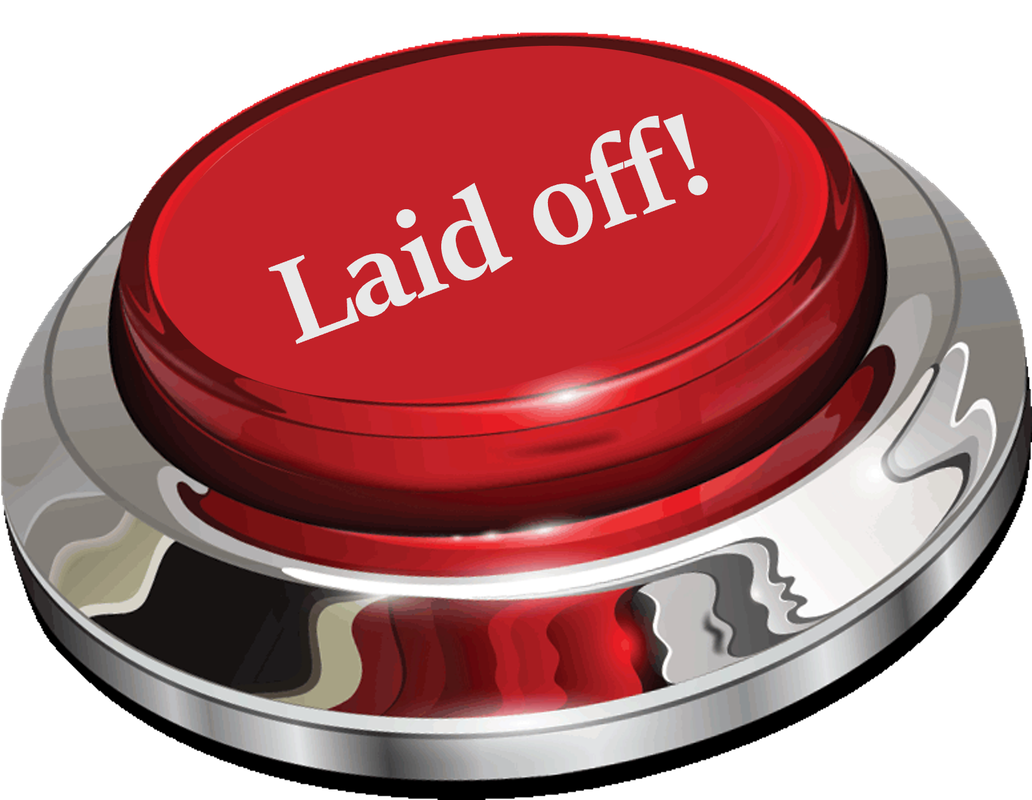
Just get laid off?
Click here for info on what to do first. Author7-time layoff survivor Brenda L. Peterson, The Layoff Lady, waxes poetic on layoffs, job transitions, & career resilience. Buy The Book!Were you recently laid off from your job and need a roadmap for what's next? Pick up a copy of my book, Seven Lessons From Seven Layoffs: A Guide!
Categories
All
Archives
July 2024
|











